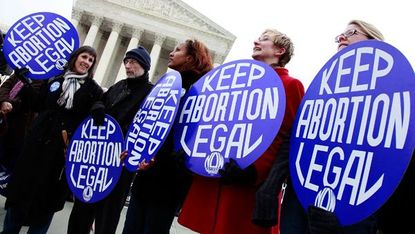

Abortion rights have seen some serious hits this year. Thanks to strict legislation, more and more clinics, especially in southern states, have closed their doors. However, supporters of this pro-life legislation have faced more losses than wins this month. Just over the past week or so, there's been a pushback against these stringent laws coming from the courts. Last week, three appellate court judges ruled against the passage of a law that would close Mississippi's last standing abortion clinic, effectively ruling out a woman's right to choose within the southern state's borders.
Alabama joined Mississippi's ranks this week when federal district judge Myron Thompson ruled that the state's Women's Health and Safety act, which had been made law last year, was in violation of a woman's constitutional rights. If it had remained in place, Alabama's law wouldn't have been quite as destructive as Mississippi's had the potential to be: It would have closed three of the state's five remaining active abortion clinics. Judge Thompson claimed the law's attitudes towards abortion creates a "climate of extreme hostility" that makes it much harder for the doctors performing abortions and women receiving them.
Strict regulations like this one, the overturned law in Mississippi, and Texas's famed HB1 bill from the summer of 2013 are just a few examples of legislation that works to undo the rights that Roe v. Wade put into place over forty years ago. Currently, there are five states that still have such comparable laws enacted: North Dakota, Tennessee, Texas, Missouri, and Utah. But as more and more states attempt to enact these sort of restrictions on abortion access, the more courts are starting to pushback against them, oftentimes under the argument that they violate a woman's constitutional rights. So far, two states besides Alabama and Mississippi have seen a overturning of abortion-limiting laws: Kansas and Wisconsin.
Proponents of the Mississippi law argued that women could visit a neighboring state that does have open abortion clinics. This isn't the first time a state has threatened to close off services to its inhabitants, using a nearby states's access to such services as a scapegoat. However, a 1938 Supreme Court ruling stated that "no state can be excused from performance by what another state may do or fail to do." While this ruling dealt with denying admission to a black man but offering him the money to fund his education elsewhere, the same logic applies here. Sending Mississippi women seeking abortions over to neighboring states is doubly unconstitutional, both under Roe v. Wade as well as this SCOTUS decree.
That's not even bringing the question of putting an "undue burden" on abortion clinics, which is forbidden by the Planned Parenthood v. Casey SCOTUS decision of 1992. Pushing women miles away from their homes, out of their state of residence qualified as "undue burden", Thompson said in his 172-page ruling.
Mississippi and Alabama may be making a turn towards further freedoms for women seeking abortions, but the fight for pro-choice rights nationwide is still going strong. Arizona looks to be the next state to cause an abortion legislation-fueled stir. The state's laws on abortion medications have earned them the title of the most restrictive in the nation. The state regulates the place and method for women taking abortion-inducing drugs, as well as restricts their use to the seventh week of pregnancy. After a debate between Planned Parenthood of Arizona and the Arizona courts, it's looking like the next step for the fight is to head to the Supreme Court.
When lawmakers pass legislation that threatens a woman's right to an abortion (protected by the Supreme Court, by the way), it is the courts that have the power to fight back against it. What's still to be seen is whether or not the court's actions in Mississippi and Alabama will cause a nationwide trickle of pushback against such laws.
Stay In The Know
Marie Claire email subscribers get intel on fashion and beauty trends, hot-off-the-press celebrity news, and more. Sign up here.

I'm an Associate Editor at the Business of Fashion, where I edit and write stories about the fashion and beauty industries. Previously, I was the brand editor at Adweek, where I was the lead editor for Adweek's brand and retail coverage. Before my switch to business journalism, I was a writer/reporter at PEOPLE.com, where I wrote news posts, galleries and articles for PEOPLE magazine's website. My work has been published on TheAtlantic.com, ELLE.com, MarieClaire.com, PEOPLE.com, GoodHousekeeping.com and in Every Day with Rachael Ray. It has been syndicated by Cosmopolitan.com, TIME.com, TravelandLeisure.com and GoodHousekeeping.com, among other publications. Previously, I've worked at VOGUE.com, ELLE.com, and MarieClaire.com.
-
 Kourtney Kardashian's Birthday Cake Reignites a Classic Family Joke
Kourtney Kardashian's Birthday Cake Reignites a Classic Family JokeShe's officially the "most exciting to look at."
By Meghan De Maria Published
-
 Nicola Peltz Beckham Dishes on What It’s Like Inside Mother-in-Law Victoria Beckham’s Closet
Nicola Peltz Beckham Dishes on What It’s Like Inside Mother-in-Law Victoria Beckham’s ClosetIf ever there was a closet we’d like to raid, Posh’s would top the list.
By Rachel Burchfield Published
-
 Hailey Bieber's Coachella Wardrobe Is Pants-Free, Of Course
Hailey Bieber's Coachella Wardrobe Is Pants-Free, Of CourseThe model will still wear bloomers, but not actual pants.
By Halie LeSavage Published
-
 36 Ways Women Still Aren't Equal to Men
36 Ways Women Still Aren't Equal to MenIt's just one of the many ways women still aren't equal to men.
By Brooke Knappenberger Last updated
-
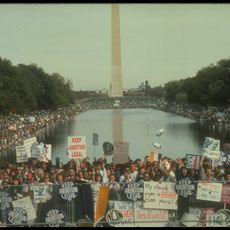 Roe Is Gone. We Have to Keep Fighting.
Roe Is Gone. We Have to Keep Fighting.Democracy always offers a path forward even when we feel thrust into the past.
By Beth Silvers and Sarah Stewart Holland, hosts of Pantsuit Politics Podcast Published
-
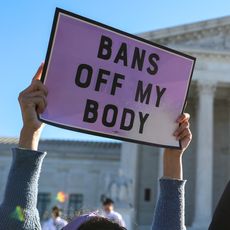 The Supreme Court Is Hearing Arguments in a Case That Could Overturn 'Roe v. Wade'
The Supreme Court Is Hearing Arguments in a Case That Could Overturn 'Roe v. Wade''Dobbs v. Jackson Women's Health Organization' is the most consequential abortion rights case in decades.
By Rachel Epstein Published
-
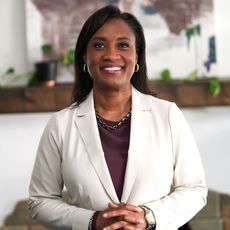 EMILY's List President Laphonza Butler Has Big Plans for the Organization
EMILY's List President Laphonza Butler Has Big Plans for the OrganizationUnder Butler's leadership, the largest resource for women in politics aims to expand Black political power and become more accessible for candidates across the nation.
By Rachel Epstein Published
-
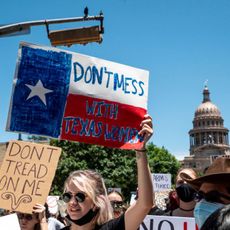 Want to Fight for Abortion Rights in Texas? Raise Your Voice to State Legislators
Want to Fight for Abortion Rights in Texas? Raise Your Voice to State LegislatorsEmily Cain, executive director of EMILY's List and and former Minority Leader in Maine, says that to stop the assault on reproductive rights, we need to start demanding more from our state legislatures.
By Emily Cain Published
-
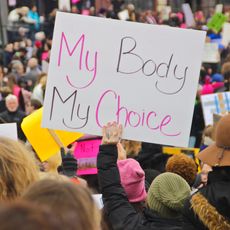 Your Abortion Questions, Answered
Your Abortion Questions, AnsweredHere, MC debunks common abortion myths you may be increasingly hearing since Texas' near-total abortion ban went into effect.
By Rachel Epstein Published
-
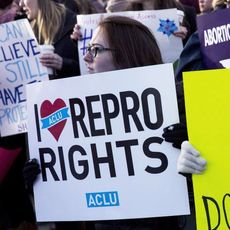 Trump Vows to Appoint Pro-Life Judge to Supreme Court
Trump Vows to Appoint Pro-Life Judge to Supreme CourtIn a new interview with 60 Minutes, the President Elect confirms his stance on Roe v. Wade.
By Sally Holmes Published
-
 The Future of Afghan Women and Girls Depends on What We Do Next
The Future of Afghan Women and Girls Depends on What We Do NextBetween the U.S. occupation and the Taliban, supporting resettlement for Afghan women and vulnerable individuals is long overdue.
By Rona Akbari Published